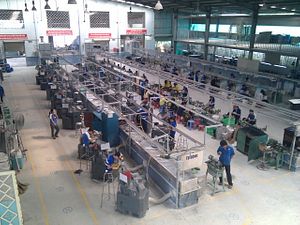The Asian Century has begun.
The Asia-Pacific region is already at the center of the world’s economic activity, and next year, its economy will become larger than the rest of the globe’s combined. The region holds 60 percent of the world’s workforce and half the planet’s population. Asia’s importance will only grow in the years to come.
But behind the promise of a rising tide lies the reality that, in our region, too many are being left to drown, without a boat to cling to. As our tide swells, so does inequality.
Working poverty, informal and vulnerable employment, and weak or poorly enforced labor protections are among the problems plaguing our region. These challenges are intensified by the growth of platforms like Uber that encourage precariousness as well as technologies that extract workers’ data and diminish their share of income.
Our responses to these realities will be the true measure of the Asian Century’s success. Unions have a critical role in forging this way forward.
We must redouble organizing drives at multinationals and other large employers in the region. We must increase the participation of women and young people in the union movement. As the region’s economies and companies become more integrated, so must our labor movement and our approach to trade. Working with social partners, we must make the new world of work benefit the many. Together with like-minded organizations, we must tackle the challenges of climate change, migration, and informal economy.
This week in my home country of Nepal, I was elected Regional Secretary of the UNI Asia and Pacific Regional Organization, representing millions of workers in some 20 countries. In many ways, it is a daunting task to help our region’s labor movement make the changes necessary and adopt the strategies needed for a just Asian Century.
But I am bolstered by what has been achieved in Nepal, which in 2015 suffered a devastating earthquake, because here we are witnessing the beginning of a just transition.
Part of that is due to the efforts of brave workers like Keshav Chaulagain, a man “disappeared” by the army for six months and then fired for union organizing. Keshav eventually won his job back, and with the support of UNI, sparked the unionization of Nepal’s private health care system.
These workers have won better salaries, access to healthcare for their families, and the right to work free from discrimination, among other things. They have established committees to ensure that women are empowered in their unions.
While this is a small example, ultimately, it is a telling one. It shows that obstacles can be overcome and that with perseverance and strategy, setbacks are temporary. It is an example of how workers have the power to combat inequality, and it is something we are seeing region wide.
But we need more.
The narrative of the Asian Century is one of growth. This story of expansion must include the growth of unions, the growth of social partnership and the growth of dignity on the job — from workplace to workplace, from country to country.
Writing those chapters is the job of unions, workers, and activists calling for a more equal Asia. And we are ready.
Rajendra Kumar Acharya is the new Regional Secretary of the Asia Pacific Regional Organisation (Apro) of UNI Global Union.
































